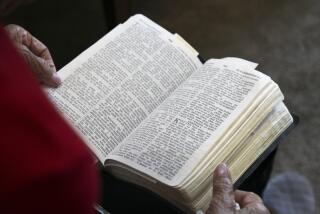The Last Word in Bible Dictionaries : The Nondenominational Six-Volume Publication Is 7,000 Pages, Sells for $360
- Share via
With its more than 7,000 pages weighing in at more than 27 pounds, the new six-volume “Anchor Bible Dictionary” is touted by Doubleday as undoubtedly the heaviest work it has ever published.
The prodigious work involving 1,000 Bible experts--almost a “who’s who” of biblical scholarship--is also being promoted as the definitive Bible dictionary for the next two generations.
Editor in Chief David Noel Freedman says the high hopes are based on former Brooklyn Dodger General Manager Branch Rickey’s theory of how to build a pennant winner: Buy up all the best players.
But the success of the $2-million project also rests on the premise that students of the Bible are interested in a scholarly approach to a book that was written by people with strong faith commitments and has been interpreted for millennia through the faith of its readers.
Unlike the practice in some of the dictionaries that have preceded it, contributors to the new dictionary--who include Catholics, Protestants, atheists and Jewish and Muslim scholars-- were asked to check their faith at the door before submitting their articles on topics ranging from angels to zoology.
“The ‘Anchor Bible Dictionary’ cannot be characterized as belonging to anyone except all of humanity,” said Thomas Cahill, director of religious publishing at Doubleday.
One would have to go back to the “Interpreter’s Dictionary of the Bible,” published in 1962, to find a Bible dictionary similar in scope to the nearly 7-million-word Anchor dictionary published July 8.
The new dictionary, which retails for $360, incorporates the advances in biblical scholarship during the last 30 years, including the massive work that has been done recently in the study of the Dead Sea Scrolls and the Nag Hammadi Codices.
Hershel Shanks, editor of Bible Review, said the “Interpreter’s Dictionary” is still considered a classic work, but that it is outdated.
“The pace of biblical scholarship, even in the past two decades, has been enormous,” he said.
The new dictionary, in its scope and general level of scholarship, also is enormous, said Shanks, who was not involved in the project.
“This will be a landmark for decades to come,” he said.
One other major distinction from previous dictionaries noted by the editors of the new work is its lack of a sectarian focus.
Freedman, who also worked on the “Interpreter’s Dictionary,” said the previous work maintains a primarily Christian orientation.
“That was essentially a Protestant American undertaking,” he said.
But that is who was mainly interested in the Bible in those days, Freedman added. In the last generation, he said, there has been an explosion of interest in Bible scholarship among Catholics, Jews and intellectuals from other backgrounds.
The new dictionary is intentionally nondenominational, Freedman said.
“Strictly, the framework is scholarly,” he said. “What we were interested in is the present state of biblical scholarship.”
Some scholars have criticized the new trend in biblical scholarship for narrowly focusing its emphasis on areas such as linguistic and archaeological research, and spending relatively little time on issues of faith that have made the Bible the most influential document of all time. Attempts to establish what some consider almost a “value-free approach” to studying the Bible create a dichotomy between Bible scholarship and religious practice, some citics have said.
But Freedman says the “total sea change” in biblical scholarship has been for the better.
“The Bible belongs to the whole world,” he said.
And Cahill, who is predicting $50 million in profits for the dictionary in five years, said the change also reflects readers’ changing tastes.
More to Read
Sign up for our Book Club newsletter
Get the latest news, events and more from the Los Angeles Times Book Club, and help us get L.A. reading and talking.
You may occasionally receive promotional content from the Los Angeles Times.








